Summaries
A case study examining the factors that influence year 9 student choices regarding GCSE subject options.
- Collaborative learning technologies
- Qualitative
- Teacher
- Beliefs
- Secondary
- Mainstream
- perceived satisfaction
- Perceptions
- teacher beliefs
There are a variety of factors that play an influential role when a student decides on what subjects to study at GCSE level. Based on the existing literature, the main factors are whether a student finds a subject interesting, the perceived usefulness of a subject to future educational and professional goals, and the influence of parents and teachers. This case study aimed to examine whether these factors were relevant to the year 9 cohort in my school through the implementation of various data collection methods. These included a pupil voice survey, focus group interview and interviews with key stakeholders to assess the perceptions students have of geography and the factors that influence the GCSE subject options process. Additionally, data was collected on whether students believe senior leadership decision-making in their school has restricted their educational and professional aspirations. The findings of the case study indicate that the way geography is taught is the most important factor in generating a positive perception of the subject (56.5% of students agreed). Finding a subject interesting was the most influential factor in why students chose to study geography at GCSE level whilst responses from focus group participants indicated that a key reason was that geography is ‘easier to understand than history’. Whilst data from the pupil voice survey suggested that teachers and parents were influential in a student’s decision-making process, comments during the focus group interview highlighted the influence of peers, an area that has limited existing literature. For the most part, students agreed that senior leadership decision-making had a minor impact on their choices process with many agreeing that subject options process was fair (40.5% of students agreed). However, during the staff interviews both the head of geography and history highlighted how curriculum restraints had hindered their ability to foster interest in their respective subjects. Ultimately, subject teachers hold a significant degree of responsibility in this regard. Given the importance of pedagogy in influencing subject choice, teachers need more autonomy to plan and teach a curriculum that encourages students to continue their studies at GSCE level, A-Level and beyond.
I have chosen to present my findings to the maths department and Senior Leadership Team (SLT) at School X in West Cumbria, because this is where the research took place and because this is where I feel the greatest impact will be made. The maths department will benefit from my research because I investigated strategies for boosting confidence and enjoyment in maths specifically, and although the research was focused on one class and as a result the ideas expressed by the students therein will differ from those in other classes, the principles employed throughout my research were literature-based and are applicable to all maths classrooms; principles I believe are worth using in classes across the department. I have chosen also to present my research to the SLT at school X because of the school-wide focus on having more pupils achieve grades 7 and above in their subjects. My research has focused on a class in which some students are aiming to attain a grade 7 in maths, so the strategies that have benefitted them may also benefit students in similar positions across subjects. For example, using student voice to understand pupils’ interests and involve them in the planning process is something that will be helpful in many classrooms. Performance in maths within School X is not low, but there is always room for improvement. Hence there is a need for implementing strategies or interventions to try to boost pupils’ attainment where possible. Given that my research suggests that there is a link between students’ attitudes to maths, their confidence in maths and their performance, it is important that we try to promote strategies which address issues with attitudes and confidence in order to improve performance. I have been able to try out different strategies over the course of five lessons, which included a range of topics, to try to determine which strategies are effective in building students’ confidence and improving attitudes to maths by boosting enjoyment. The questionnaires and group interviews allowed me to see which of these strategies, and others, have a positive effect on students. There was not a consensus among the students as to which strategy was the best, but this points to why my research will be useful for the department – different students enjoy different approaches, but there are some which are popular amongst large portions. It is therefore useful for the department to know which strategies they may wish to introduce more frequently and how they can do so. For example, having observed other maths lessons and discussed experiences with colleagues, it is clear that pupils do not get the chance to collaborate very often, despite this being something that my students – and possibly students in other classes – place great value on. Some members of the SLT have taken an interest in my research – specifically the Headteacher and the Assistant Head responsible for Teaching and Learning, who has also been my ECT tutor for two years and in charge of my training for one year before that. It is therefore important that I share the results of my study with them to inform them of my progress, but also so that I can provide recommendations that they may wish to take forward into the teaching side of things at school. While my research has been based in the maths classroom, collaboration, students’ interests and student voice are part of many classrooms, and the value that students have placed on these things may inform curriculum planning going forward. The school wants learners who are engaged, positive about their learning, and performing well, and I hope that the strategies that I have identified, while already employed across many classrooms, can continue to encourage this kind of environment for pupils across the school.

A case study exploring experiences and perceptions of mentoring in the context of the Early Career Framework
- Interview
- Survey
- Mainstream
- Peer supervision
In 2019, the Government published the Teacher Recruitment and Retention Strategy, which focused on trying to improve recruitment rates in the teaching profession whilst reducing the rising rates of qualified teachers leaving the profession. At the centre of this Strategy was the introduction of the Early Career Framework, a fully funded package of two-year support for new entrants to the profession that provided a suite of training materials and a subject mentor with funded time dedicated to undertaking the role of supporting the development of the early career teacher. Whilst there have been several studies published into the experiences of early career teachers since the introduction of the Framework, substantial research into the experiences of mentors has been lacking, limited to evaluative surveys or combined with studies into the experiences of other participants. Therefore, this small-scale case study explores the experiences of mentors in one secondary school in northwest England following the introduction of the Early Career Framework. Through a combination of questionnaires and semi-structured interviews, this study aims to investigate how the Early Career Framework has impacted mentors and the opportunities and challenges that have been created through the introduction of the Framework. The findings of this study suggest that, whilst the aims and intentions of the Early Career Framework are welcomed by mentors, the implementation and practical implications of the Framework present several significant challenges to the workload and wellbeing of mentors. In line with this study’s conclusions, the recommendations to policymakers focus on designing an effective and efficient programme that considers the concerns of mentors at the forefront. As well as this, this study recommends that school leaders consider how the implementation of the Framework in their setting may present significant challenges to mentors and use the mechanisms available to them within their setting to ameliorate these challenges.
The needs of this community are complex and exist on multiple levels. For some mentors, a need for clarity and consistency is their primary need; for others, a need for efficiency and effectiveness of their time is their most important. Communities are defined by their complexity, none more so than schools such as the ones which Teach First primarily serve. However, one need that permeates throughout the whole community of mentors is the need to feel as though the policy and practice changes introduced through the ECF are ‘making a difference’. The present time, after the ECF has been rolled out and in place for a number of years, marks a significant moment in the efficacy and longevity of the ECF. Therefore, one of the primary goals of the dissemination of this research is to ensure mentors continue to buy into the Framework and remain optimistic and enthusiastic about the ECF. The knowledge I have generated in this study has the potential to have salient impacts on the community of mentors. At a local level, the findings about clarity and support have the potential to drive organisational change and improve the culture of mentoring in my immediate school context. However, at a wider and more national level, the findings about apathy and lack of engagement with training providers and online content has the potential to drive significant change for the wider community of mentors. Further research should look to investigate the experiences and perceptions of mentors to the training they receive; motivated by the findings of this study, this further research has the potential to drive significant change and result in significant improvements for mentors on a more national scale.
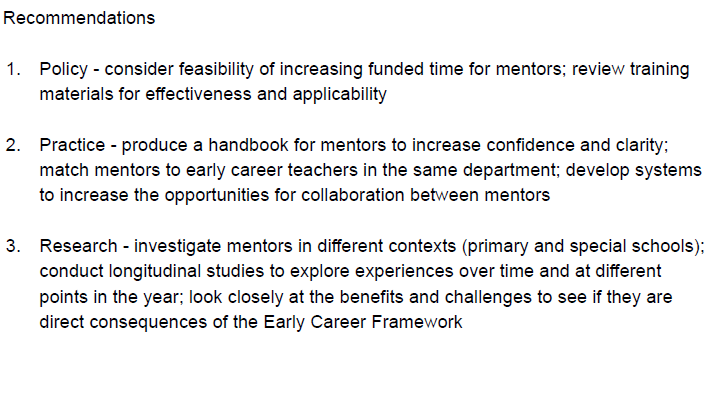
A case study investigating what effective homework looks like using teacher and student feedback in a digital age.
- Qualitative
- Student
- Survey
- Focus group
- Homework policy
Homework has been a contentious issue for many years with some educators rallying behind traditional practices, while some are calling for it, in this digital age and following the Covid-19 pandemic, for its end. The need for homework needs to be reevaluated and redefined. It has become apparent that away from the old paradigm to a new landscape. This case study analyses teacher and student perceptions of effective homework and compare them to what literature and research suggest makes effective homework. This enabled further understanding of new homework how homework is perceived in the context of the school research site, and the findings were used to inform future homework policy. Results show that initial teacher training on the subject of homework was limited despite it being included in the National Teaching Standards. Early career teachers and experienced teachers showed frustration with the lack of student completion. However, student responses suggested an awareness of effective homework practices signifying an understanding and willingness to complete homework. This highlighted a lack of understanding of why students fail to complete homework which needed further investigation is the context of this case study. Additionally, despite the generation of ‘digital age’ teachers, early career teachers appeared to prefer more traditional book-base work as proof of homework so that students could revisit it easily and as a way of evidencing homework. In addition, there was a reluctance to fully utilise online systems, fearing that potential technical glitches might impact on student learning and would mean that they would not complete homework tasks. Lastly, the notion of the effect of homework within the context of school was ultimately flawed, as there was a limited understanding amongst teachers and students about what the purpose of homework. This lack of a consensus amongst the school community suggests the need for greater clarity in the homework policy in order to encourage more effective homework.
I chose to undertake this case study in my own school as this was where I had access to investigating homework on a day to day basis. I was able to speak with teachers regularly to promote the completion of homework feedback. In addition, I could work with students I teach to gain an insight into their perceptions of homework. As this was a case study, the purpose was to study "a contemporary phenomenon with some real-life context" (Yin, 2003). Therefore, this meant that the issue of homework and the debate around what effective homework looks like, could be studied in the context of school X.
This research was useful to the community as it has identified a key issue that is apparent in the debate around homework being that the purpose of homework is ambiguous and needs clarification. It has also provided a suggestion for creating effective homework which can be used by teachers in order to bring consistency of the provision of homework across the school. This means, instead of focusing on the activity, consider a criteria which identifies what effective homework looks like and compare tasks to this. In addition, it has identified the reasons why students may not have been completing homework and will allow the school to address this issues moving forward in a more appropriate way than they may have been previously.


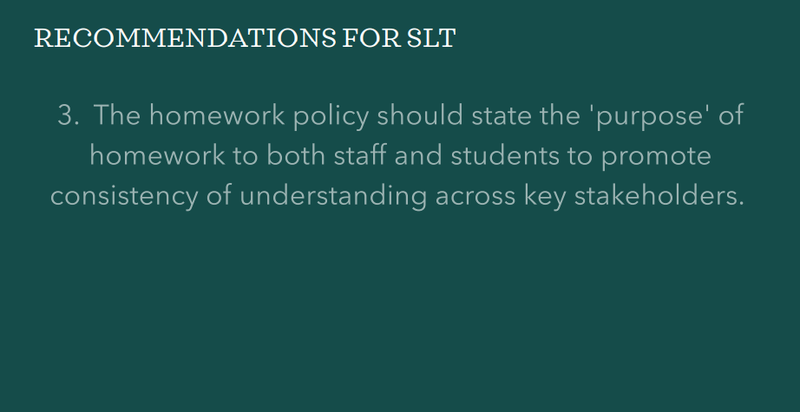
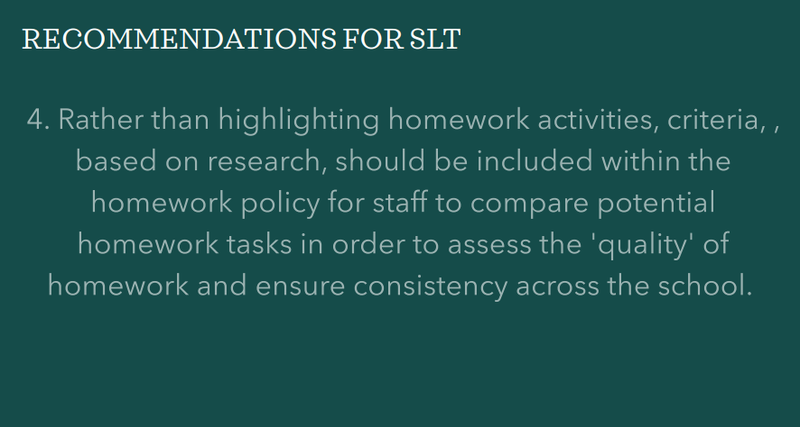
A case study to investigate the value of Trauma Informed Theory in Leadership Strategies within an Educational Setting
- Learning environment
- Qualitative
- Mainstream
- Education
- Wellbeing
- Emotion
- Classroom Observations
It is apparent that schools are becoming increasingly concerned about their role in supporting mental health and wellbeing for the pupils within their care. Through this, there is a growing discourse in Trauma Informed Theory. This, however, is often limited to contexts outside of the UK, or is focused on agencies outside of education. As such, there is a gap in the literature for a piece of research which focuses on Trauma Informed strategies within schools in the UK. Therefore, any new piece of research based around this is pioneering. This paper explores the strengths and weaknesses of current Trauma Informed strategies being used by schools within the UK. Using the researchers own educational setting as a case study, this research will explore the ability for pupils to adopt socially appropriate behaviours based on trauma informed strategies implemented. Interviews and a focus group were used to identify themes, perceptions and insights into the current trauma informed strategies used by the case study school. This data collection, combined with analysis of behavioural data and field observations, yielded results which showed the vital need for these strategies to be maintained, with some realistic adaptations to allow them to develop and make progress. hrough qualitative analysis of interviews and focus groups, analysing school data, as well as field observations, the following questions have been answered: How is Trauma Informed Theory carried out within the educational setting of the school? What are the strengths and weaknesses of the Trauma Informed Theory within the school? What recommendations can be made to allow the school to build upon the Trauma Informed Theory?
As a case study, the recommendations are directly relative to the community to which I am reporting. Throughout the dissertation process, I have worked closely with several leaders and staff within the school community. Support has been given to carry out this case study research, and because of this, access to data and observations has been granted permission, and actively encouraged, to ensure effective recommendations are established. The impact of this, will be an ability for leaders to make timely, manageable, cost-effective changes to small aspects of these trauma informed strategies. This will allow progress to be made, which will ultimately help some pupils at the school who experience traumatic events. For the school, an important part of this research was dissemination of the findings. This was done, initially, through a fifteen-minute presentation, which took place during an SLT meeting[1]. Leaders within this meeting included the Principle, Vice Principle, and Safeguarding Lead. From this, some recommendations have been actioned by leaders for the next academic year. At the heart of the community I have chosen, is a school ethos based on Trauma Informed Theory. Through whole school CPD on Trauma Informed Theory with an external specialist, I was introduced to the concept. It was from this point that I became passionate about improving my own practice whilst being mindful of the impacts of trauma amongst students, and my role in reducing those impacts as best as possible. In my own personal reflections, I was proud of the work my educational setting has done to provide opportunities to support these vulnerable students and wished to help progress these opportunities to make them more meaningful. It was then clear that the most significant piece of research, for myself and the community I worked in, was to reflect and recommend on Trauma Informed Strategies within education. The needs of the community, in relation to Trauma Informed Theory, which were uncovered by the research, were threefold. Firstly, it uncovered that partnerships must be strengthened between those who lead the trauma informed strategies, and the rest of the school. Data was unanimous in highlighting the lack of understanding between staff about the purpose, function and objectives of the strategies were. Secondly, analysis showed that these trauma informed strategies need to be more skilfully staffed to ensure they run effectively, whilst allowing staff working within these areas to be given appropriate training. Finally, a more robust way of measuring the impact of the trauma informed strategies must be developed by leaders, which should be fed back to staff to further strengthen partnerships. Through the data analysis process, it was possible to generate recommendations. This will be impactful upon the community since these have been generated to be as realistic as possible, for them to be embedded straight away, at the start of the next academic year. For these recommendations to have an impact, it was vital for them to be cost effective, and manageable to for school. Taking into consideration financial concerns nationally within education, it would be futile to create a list of recommended changes which were costly. To allow the community to recognise the impact of the study, it was also important to ensure recommendations were able to be enforced quickly, based on the current structure of the school, to allow progress in the trauma informed strategies to start as soon as possible. Through these guarantees, the recommendations will be impactful on the community. Most importantly, this piece of research will allow vulnerable students who access the trauma informed strategies due to currently dealing with traumatic events or dealing with the lasting impacts of past traumatic events, to feel further supported within school. This is due to these recommendations providing a useful starting point for greater organisation within the areas where these strategies operate. This will aid the school in the short term, as there should be less commotion around the building as these students will be in effective sessions. Also, in the long term, it will allow students to have built meaningful relationships with staff using these trauma informed strategies. They will have formed a greater sense of self and learnt to consistently work in a team to positively support their peers. These are things which trauma informed theorists believe are most effective in overcoming, for students to leave school with a greater chance of success and wellbeing.
ADHD: Inclusive Educational Practices
- Primary
- Inclusion
- ADHD
"The poster offers an overview of Attention Deficit Hyperactivity Disorder (ADHD), focusing on the challenges, strengths, and strategies to support children in the primary environment. I created an iceberg to illustrate that while ADHD's visible symptoms—such as inattentiveness, hyperactivity, and impulsivity—are easily recognised, many internal struggles often remain hidden. Beneath the surface, children with ADHD may face difficulties such as cognitive impairments (e.g. poor working memory and executive dysfunction), time-blindness, emotional dysregulation, rejection sensitivity, sleep disturbances, and low self-esteem (Mandriota, 2022). These challenges can hinder their learning and must be carefully considered when developing inclusive support strategies. The poster highlights several key barriers to learning both academically and behaviourally, however I will expand on some of these aspects. Academic Strategies
Reduced working memory can create barriers regarding the retention of information and impedes learning due to increased risk of cognitive overload (Langerock et al., 2025). As such, adaptive strategies that alleviate cognitive load are supportive for students with ADHD. These include breaking tasks into smaller, manageable steps (chunking), giving clear and explicit instructions, dual-coding learning material (combining visual and verbal cues) and providing a What a Good One Looks Like (WAGOLL) to reduce cognitive load by clarifying task expectations (ADHD Foundation, 2022).
Sustaining attention for extended periods can be challenging for children with ADHD. Consequently, an effective strategy to address this is incorporating brain breaks—short, structured breaks that allow children to reset and improve focus. Physical activity during these breaks can further support attention and learning (Arenas et al., 2024). Further, children with ADHD may experience hypo or hypersensitivity to sensory stimuli or may seek sensory input to self-regulate, which can hinder concentration (Shimizu et al., 2014). The poster details reasonable adjustments that can be made to accommodate these needs, however fidget toys should be deployed with teacher discretion as these can help or hinder learning depending on the child’s needs and the situation (Aspiranti & Hulac, 2021).
Behavioural Strategies
Poor behaviour choices can present challenges for children with ADHD due to heightened impulsivity and reduced self-regulation capacities (Staff et al., 2023). Therefore, effectively managing behaviour is an essential endeavour for teachers. One of the most important strategies to support behaviour is through providing consistent praise for positive behaviours and expertly withdrawing attention to limit the amount of negative attention the child receives (DuPaul et al., 2011). Research demonstrates that children with ADHD receive a disproportionate amount of negative attention relative to their neurotypical peers, resulting in negative attitudes towards school and impacting self-esteem (Zeigler, 2008). Additionally, implementing structured reward systems/charts and setting achievable behavioural targets can motivate children, give them a sense of accomplishment and enhance self-esteem, which benefits learning (Tripp, 2022). Consistent communication between the school and the child’s caregivers is also advantageous as regular updates, coupled with shared strategies for support, ensure a holistic approach to addressing the child’s needs (NSW Government, 2024).
Strengths
While ADHD presents challenges, children also possess unique strengths. They often exhibit creativity, imagination, and heightened curiosity that can foster a passion for learning (Gonzalez-Carpio et al., 2017). Teachers can leverage these strengths by encouraging the child’s inquisitive nature and helping them explore their interests through creative and hands-on activities. Children may excel in subjects that engage their creativity or physical activity, such as art, music, or physical education (McDougal et al., 2022). By incorporating these interests into wider lessons, adding creative or practical elements to the learning, teachers can keep students engaged (Holmes, 2024).
The poster demonstrates that ADHD is a multifaceted condition that requires a thoughtful, individualised approach. Unfortunately, ADHD is still conceptualised as a ‘disorder’ and is often met with a negative stigma (Mueller et al., 2012). The first step in creating an inclusive environment is to reconceptualise our attitude towards the condition. It is essential that teachers and school staff are well-informed about ADHD and adopt a growth mindset toward each child’s abilities (McDougal et al., 2022). Adopting this mindset and using a variety of inclusive strategies will allow children with ADHD to thrive at school both academically and personally. "
I have learned that inclusive education involves creating a learning environment that supports and challenges all children, removing any barriers they may face. This does not involve separating certain individuals from others, removing them to partake in different activities, but rather calls for the inclusion of all in the classroom together. I can further build on my professional understanding by remaining well-informed about evidence-based practices and adjustments made to accommodate the varied needs of a class of children, but also through consistently reflecting upon the strategies I am observing and speaking to expert professionals such as SENDCos and members of senior leadership to discuss how they ensure the school is an inclusive and supportive environment for all. As a trainee primary school teacher committed to inclusive educational practices, enhancing the impact of my teaching on each child's learning requires an equity-focused approach. This involves recognising that each student has unique needs, backgrounds, and starting points, and adapting my teaching to ensure all learners can succeed in my classroom. Providing equity of access to the curriculum requires providing differentiated support tailored to individual needs, such as scaffolding tasks, offering multiple channels of representation and engagement, and engaging in adaptive teaching strategies. By using formative assessments and ongoing feedback, I can identify barriers to learning and adjust my approach accordingly. This may include modifying resources, using ICT tools for accessibility, or incorporating culturally responsive teaching methods to make learning meaningful for all my future students.
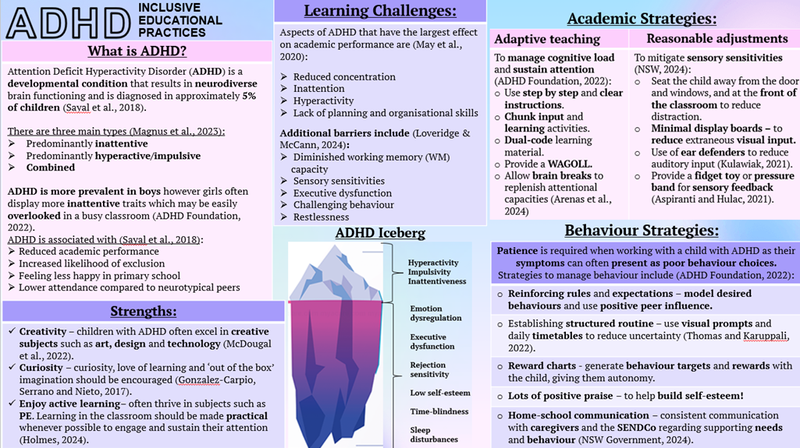
“A good transition is just key” Supporting Autistic Students in the Transition to University: A Qualitative Exploration of the Views and Experiences of Disability Support Staff
- Interview
- University
- Qualitative
- Teacher
- Secondary
- Special educational needs and disability (SEND)
- Education
- Wellbeing
- Emotion
An action research investigation into the effects of science specific literacy on students’ ability to improve scientific writing.
- Document analysis
- Qualitative
- Student
- Secondary
- Mainstream
- Education
- Quality education
Science literacy plays an important role in the learning of science and is essential for students to understand and apply their science knowledge. As a result of the worldwide Covid pandemic students at my school missed many classroom hours, therefore had a reduced knowledge of the science curriculum. Furthermore, due to missed lessons in other subject areas, such as English, the average reading age of students had declined, with an average student reading three years younger than would be expected. These two issues created a perfect storm in relation to GCSE exam performance. Students did not have the high level of comprehension, nor the science literacy to fully answer and apply their knowledge. An intervention for Year 10 students (aged 14-15 years) was implemented, with the overall aim being to increase science literacy, understanding and exam performance. Students were given a questionnaire and interviewed in a group setting to gain their insight on the issues raised and feedback in relation to the intervention strategies and techniques. Written work from the students was reviewed after the intervention to ascertain if their application of knowledge had improved. The results from this research supported the outlined aims. Students found the intervention strategies useful and were seen using them when answering exam questions. Over half of all students were awarded full marks on all questions which would gain a maximum of 4 and 6 marks respectively. One question awarded 77% of students with full marks. These results are positive in relation to the intervention, but difficult to generalise to other students. The study was only implemented on a small number of high and middle ability Year 10 students within a Physics classroom over a short period of time (6 weeks), therefore further research needs to be conducted to test the repeatability and the reproducibility.
The results from this intervention have had a positive impact on the chosen class, further research needs to be carried out on lower ability students to allow a comparison with the higher ability students from this research. As a practitioner I have found this research extremely beneficial. The intervention was easy to implement into lessons and has had a positive effect on the work and outcomes of the students. I am always striving to improve my practice and this experience has enabled me to consider different approaches which have academic support. The results will be disseminated to senior leaders and teachers during training to develop school wide interventions.
An exploration into a Primary School Teacher’s Classroom Role in promoting positive mental well-being amongst pupils in a KS2 class
- Qualitative
- Mainstream
The well-being of children is of increasing concern to parents, healthcare professionals, policy makers and educators. Set amongst the backdrop of a global pandemic, today, children are subject to considerable stress through inhabiting a landscape of worry and pressure. Schools and teachers alike have embraced the challenge of ensuring the well-being of their pupils is supported. This research delves into the concept of well-being and its importance within a primary school in Greater Manchester. It looks at teacher and pupil perspectives of well-being and the strategies used to support well-being within the school. The findings highlighted the important role teachers play in supporting the well-being of pupils in their classes. It found well-being was recognised as an important topic within the school. Teachers’ roles in promoting positive well-being amongst pupils was seen as vitally important by both teachers and pupils. It also recognised the impact well-being can have on learning. It identified pupils in the school had developed a strong understanding of their well-being in regards to what makes them happy and what makes them sad. The results also showed pupils have a growing knowledge of the strategies that they can use to support their well-being on a daily basis. The research found teachers in the school were skilled in their approaches to supporting well-being and used their understanding of individual needs to find strategies to best support their pupils. Finally, it found that well-being in this school was best supported when developed as a whole-school approach and ethos. The strategies long established within the school clearly help in supporting both teachers and pupils. However, there is still a reliance on teachers being adaptable and creative in their approaches to support well-being due to the lack of resources and time constraints placed on them in a crowded curriculum.
Visual depiction of impact is provided:
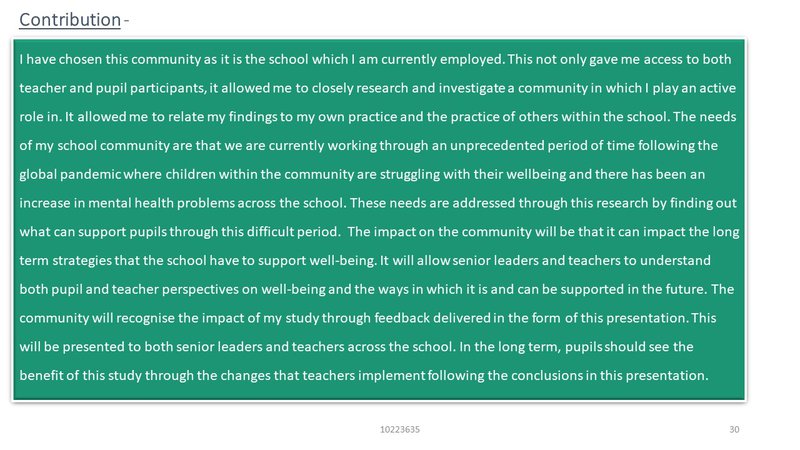
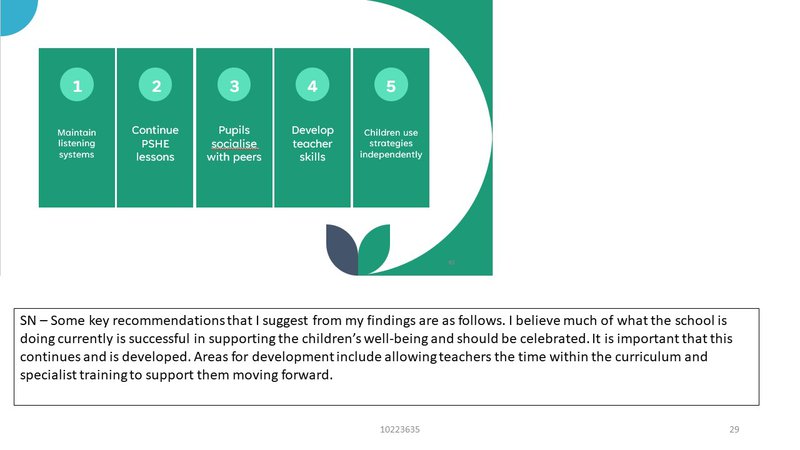
An Exploration on how Primary School Teachers Facilitate Collaborative Learning for Children with Special Educational Needs and Disabilities.
- Learning environment
- Teacher
- Primary
- Special educational needs and disability (SEND)
Vygotsky (1978) argues that the social interaction a child has is essential for cognitive development. An important tool to aid this is communication. Vygotsky (1978) also invented the concept Zone of Proximal Development. This process indicates what a child can do with and without assistant of a more knowledgeable person. Vygotsky’s (1978) theory resulted in researchers and practitioners indicating the importance of communication in aiding learning in education, resulting in the emphasis of using collaborative learning in the classroom. Collaborative learning is a tool which allows students to communicate with each other by defining concepts, challenging ideas and asking questions, resulting in the sharing of knowledge, students achieving their learning goal and the development of social and communication skills. Teachers are considered important in enabling successful collaboration in the classroom. But teachers do not consistently implement this method due to its challenges, such as curriculum demands, time and practical constraints. This study explored how primary school teachers facilitate collaborative learning for SEND children. Five primary school teachers were recruited. Semi-Structured were conducted on Zoom and participants provided consent prior the interviews. The interviews followed an interview schedule and were audio record, anonymised and transcribed. Once data was collected, reflective thematic analysis was conducted, leading to the identification of codes and five themes: the organisation of collaborative learning, providing support to SEND children during collaborative learning, the challenges of collaborative learning, training and support and the benefits of collaborative learning. The findings from this study suggests that teachers have a clear process when facilitating collaborative learning. This involves teachers’ planning collaborative learning by considering the suitability of subjects and the organisation of the children. Moreover, teachers provide support to SEND children to allow them to effectively take part in collaborative learning. For example, they monitor, question, prompt and lead groups. Teachers also use a range of resources, such as Colourful Semantics and Social Stories, and collaborative learning methods, like Talk Partner and Think Pair Share, to provide additional support for SEND children. However, teachers also encounter a range of challenges when facilitating collaborative learning for SEND children. The most significant challenge are social and communication needs becoming a barrier for children to access collaborative learning. As a result, children may demonstrate disruptive behaviour and an unwillingness to participate, which can become challenging for teachers to monitor and manage. Nevertheless, teachers try to overcome these challenge by understanding the needs of the children and using training and support from the SENDCO, but this can be limited. Teachers consider it important to overcome these challenges because of the benefits of collaborative learning for SEND children. Collaborative learning allows SEND children to develop their team working, communication and social skills, resulting in improved peer relationships, a growth in self-esteem and resilience and the inclusion of SEND children in mainstream classroom. However, more training is needed for teachers to allow them to build their confidence in using different collaborative methods and ensure collaborative learning can be accessed by all. This study adds to the research surrounding collaborative learning, but also addresses the research gaps in this area, as there is little research about collaborative learning and SEND children. This study did have a small sample size, meaning futures studies are needed to expand these findings. Future studies should involve understanding the experiences of teachers who have worked with students with severe communication and social needs, like mutism, as well as listening to the experiences of students with communication and social needs to further understand the challenges and benefits of collaborative learning.
This dissertation can have potential impact on the learning practices in the classroom. Teachers, senior leadership teams, SENDCOs and other educational practitioners can benefit from the findings. These practitioners can develop their understanding about how teachers effectively facilitate collaborative learning and its importance within the classroom in aiding SEND children’s academic attainment and development. Furthermore, the findings show the importance of senior leadership teams and other educational practitioners providing a range of training and support for teachers. Teachers want to incorporate collaborative learning but find it challenging due to the lack of training and support. By providing training and support, teachers can develop their teaching practices, knowledge of collaborative learning methods and understanding of how to ensure all children participate. This will allow teachers to become more confidence in facilitating collaborative learning, resulting in a classroom which promotes child centred learning, allows for children to develop their communication and social skills, increases peer relationships and promotes inclusivity of all.
An exploratory study of primary school staff perspectives on the Education, Health and Care Needs Assessment and the efficacy of Education, Health and Care plans in meeting children’s individual needs.
- Qualitative
- Teacher
- Primary
- Special educational needs and disability (SEND)
- Education
- Wellbeing
An investigation of practitioners’ perception of children with English as an Additional Language and their approach to teaching EAL pupils in the early years foundation stage
- Interview
- Qualitative
- Teacher
- Beliefs
- Survey
- Primary
The United Kingdom is a destination that attracts a vast amount of migrants for a variety of reasons. A high number of the migrants arriving in the UK are children who will access education, for instance, in 2019, 6% of children under the age of 18 had been born abroad (Fernández-Reino, 2020), whereas the majority of these children were non-English speakers. Additionally, a high number of children who attend schools come from families where at least one of the parents was born abroad (Fernández-Reino, 2020). As a consequence, these children will be required to learn the English language. The children who speak a different language from English are considered to have English as an Additional Language (EAL); however, they are expected to access education in the same way as English speaking counterparts. This, as a consequence, influences schools and more specifically classrooms. For that reason, this research aims to understand how teachers and teaching assistants in the Early Years Foundation Stage perceive EAL children and whether their teaching styles and approaches differ when teaching EAL children or English speakers. It also aims to understand whether practitioners recognise their ability to support EAL children and if they are aware of the EAL policies and guidance. In order to understand practitioners’ perceptions, asynchronous online surveys were applied to obtain information about how practitioners’ experience teaching EAL children in EYFS influences their practice. A selection criteria was stablished which intended to obtain information from practitioners who have experience working in EYFS with EAL children in state-maintained mainstream schools. Practitioners were contacted via email and social media, and they voluntarily decided to participate in the research. Although 129 participants replied to the online survey, only 51 questionnaires were fully completed, therefore, the rest Practitioners’ perceptions of EAL children in EYFS were removed. Once the data was collected and the unfinished questionnaires were removed, Thematic Analysis (TA) was used. Through the data analysis the following themes and subthemes emerged: Practitioners’ experience and language knowledge; Practitioners’ perceptions of EAL children and Effective ways of supporting EAL children. Following the analysis of the themes and subthemes, and according to the previous literature, it seems that EYFS practitioners believe they can adequately support EAL children. Practitioners believe that EAL children are a positive asset in the EYFS classroom because they bring diversity so children can learn from the different cultures, religions, languages or traditions. Regarding the EAL policies and guidance, EYFS practitioners thought that more specific training was needed to better support EAL children, mainly in the first years of teaching. They also suggested that schools and Local Authorities should provide more support to practitioners to ensure that EAL children access appropriate education.
This research focused on practitioners’ perceptions and their approaches to teaching EAL children in the EYFS. However, not only EYFS practitioners may benefit from this research, but all of the practitioners, because schools are constantly welcoming children arriving at any stage to their schools and they may not know English. Although practitioners may think they can support EAL children during their learning, it is important they acknowledge their lack of training, and they are capable to seek support from their own school or their local authorities. However, not only practitioners but also schools may benefit from this research. Practitioners seemed to know how to support EAL children in EYFS classrooms and they thought they were able to use approaches that were helpful for EAL children and benefited their learning. However, practitioners may need further guidance to ensure that EAL children receive the right support needed. Finally, EAL children may benefit from this research, since practitioners may become aware of their lack of training and understanding which will encourage them to improve. Practitioners accessing EAL training will positively impact their practice and consequently influence children’s learning.
A qualitative exploration of how the cost of living crisis affects young people of colour’s wellbeing in school
- Qualitative
- Beliefs
- Student
- Secondary
- Adolescents
- Focus group
- Wellbeing
A study into strategies to limit the rate of school exclusions amongst disadvantaged primary-aged children.
- Mixed Methods research
- Interview
- Document analysis
- Learning environment
- Qualitative
- Teacher
- Beliefs
- Adolescents
- Mainstream
- Equal access to education
- Quality education
There has been a concern from professionals about the rising numbers of school exclusions over the past decade, with permanent primary school exclusions having risen by seventy percent in the last year alone. Alarmingly, primary school children eligible for Free School Meals are six times more likely to be permanently excluded from school compared with their non-eligible peers. This dissertation examines the literature on what this means for pupils in their future life - in terms of academic attainment, health and life beyond school – to demonstrate that strategies need to be found to curtail these figures. By using a mixed-methods approach of interviewing six teachers and one room leader at a Pupil Referral Unit, and a desk-based literature review, it was able to conclude on, and recommend, a number of strategies that primary school practitioners can effectively use to limit the rate of school exclusions amongst disadvantaged children. Namely, these are: reviewing school policy and its day-to-day enactment; the use of behaviour-specific praise; utilising counselling, communication and language programmes and nurture groups; and providing staff with bespoke training which is tailored to individual school’s needs. Moreover, it is also recommended that the Department for Education review their funding that they allocate schools; particularly considering support packages for schools so that they have the resourcing and staffing to effectively implement evidence-informed strategies, which have the potential to limit school exclusions. These findings suggest that the levels of school exclusions in primary schools in England can decrease, with effective implementation of the aforementioned strategies.
Visual depiction of impact is provided:
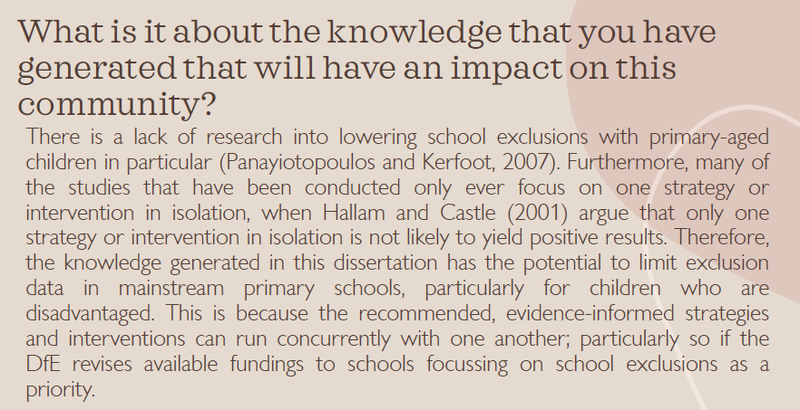
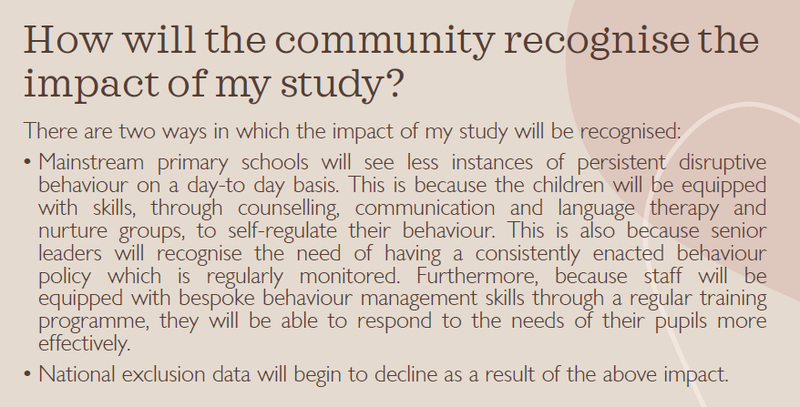
A study to determine how well career changer early career teachers engage with the Early Career Framework (ECF)
- Qualitative
- Teacher
- Beliefs
- Mainstream
- perceived satisfaction
- teacher beliefs
- Quality education
The early career framework (ECF) was introduced as the new teacher induction programme in England in 2021. This dissertation aims to evaluate how career changers have engaged with the ECF since its inception. There are challenges of recruitment and retention facing teaching in England currently, and ensuring high-quality and well-trained teachers join the profession and stay in teaching is a major focus in education. The ECF takes two years to complete, therefore the current cohort are the first to complete their training as part of the ECF. It is now time to evaluate the effectiveness of the ECF and begin to make recommendations on the positive and negative aspects of the ECF. There has been initial research on the ECF, taking the opinions of early career teachers (ECTs). This dissertation looks to add to that discourse through the unique perspective of career changers. As career changers make up an important part of trainee teachers, their views are valuable. Career changers have specific expectations and skills which they can bring to teaching. This dissertation took the views of four career changer ECTs and found that they have strong opinions on the ECF. This dissertation discusses those views and makes recommendations for future developments of the ECF from the perspective of career changers. This dissertation should add to the literature surrounding the ECF and be built upon by further research to continue to refine and develop the ECF to benefit trainee teachers.
Visual depiction of impact is provided:
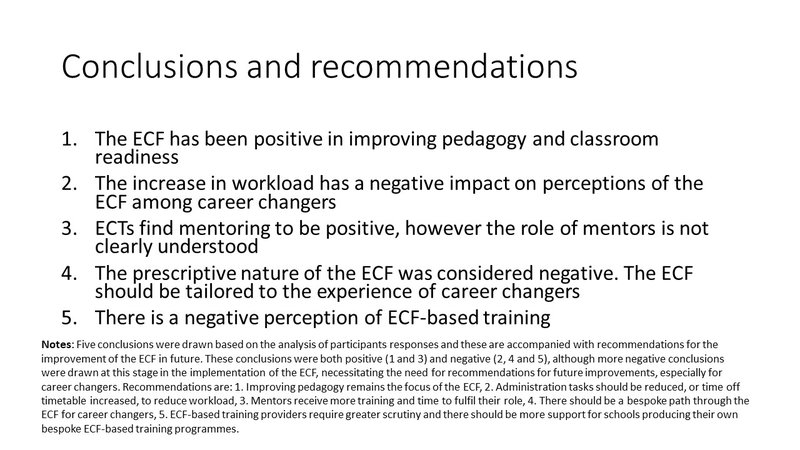
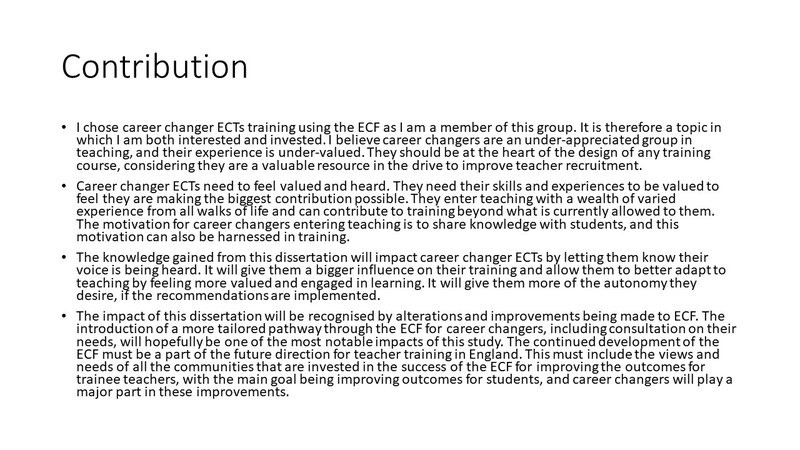
Beyond ‘Sharpening Pencils’: Teaching Assistants’ Experiences of Supporting Children’s Mental Health and Emotional Wellbeing
- Interview
- Qualitative
- Teaching assistant
Beyond the Bell: A Retrospective Study on the School Belonging of South Asian Women in Secondary Schools in Greater Manchester.
- Beliefs
- Student
- Secondary
- Southeast Asia
- Learning framework design
This dissertation aim to explore the factors contributing to the sense of belonging among South Asian girls in secondary schools in Greater Manchester, with an emphasis on the intersectionality of their identities and the role of autonomy, competent competence, and relatedness within the self-determination theory framework. By examining the complex interplay of cultural, social, and academic factors, this study provides a deeper understanding of how South Asian women experience belonging in secondary schools and the unique challenges they face due to intersection factors. The target population were South Asian women aged 18 to 25 as this was a retrospective study to mitigate ethical concerns, the study has 6 participants from different South Asian backgrounds who attended secondary school in Greater Manchester. The first research question, which sought to identify the factors contributing to South Asian women sense of belonging, revealed that the most significant factors were cultural recognition, meaningful relationships with peers and teachers, and a supportive S school environment. The second research question, which examined the visibility of experiences among South Asian women, demonstrated her intersectionality plays a crucial role in shaping students sense of belonging. The study found that individual experiences were influenced by various intersecting factors such as social economic background, level of cultural identification, and personal resilience. This highlights the importance of considering intersectionality in understanding the diverse experiences of South Asian women, as their sense of belonging is not solely shaped by their ethnic identity, but by the complex interaction of multiple social and personal factors. The third research question explores how South Asian women believe schools can enhance the sense of belonging for future generations, the findings reveal several important themes that align with current literature while offering new insights. Participants emphasised the need for schools to validate ethnic minority, experiences encourage cultural expression, and diversify their curriculum. Applying SDT within an intersectional framework revealed how South Asian woman's sense of belonging is tide to intrinsic motivation and engagement. When their needs for autonomy, competence, and relatedness are met through culturally responsive teaching, peer support, and positive teacher student interactions, they show greater academic resilience and a stronger sense of belonging this highlights the need for educational practises that support both academic success and psychological well-being by nurturing intrinsic motivations. The findings of my study extend existing research and meaningful ways, offering clarity on aspects that were previously underexplored or ambiguous with the literature. For instance, while some studies acknowledged the role of cultural factors, they often failed to explore these in relation to school belonging. These studies treated cultural influences in isolation, rather than considering how they intersect with other key factors affecting students sense of belonging. My research, therefore, bridges this gap by highlighting the interconnectedness of cultural identity with broader educational experiences, offering a more nuanced understanding of how multiple influences shape students sense of inclusion and belonging.
This research has several real-world applications, particularly in the educational sector. Schools, educators, and policy-makers can benefit from the findings by using the insights to better support South Asian women in secondary schools. The study highlights the importance of understanding the intersectionality of students’ identifies and how cultural recognition, peer relationships, and a supportive environment impact their sense of belonging. Educators can apply the findings of this research to implement culturally responsive teaching strategies tailored to the unique needs of South Asian students. By cultivating an environment that acknowledges and values diverse cultural identifies, schools can enhance students’ academic performance, emotional well-being, and overall engagement with their educational experience. The findings may also be useful for parents and community organisations that support South Asian students, as they offer guidance on how to better advocate for their children’s needs within the school system. At a broader level, the research contributes to the ongoing conversation around educational equity, promoting inclusive practices that can reduce the barriers faced by marginalised groups in the education system to increase belonging.
Children Data Protection Policy on Online Learning Platforms in Indonesia and UK: Case Study of EdTech Companies
- Mixed Methods research
- Cyberbullying
- Children data protection
- Data privacy
- General Data Protection Regulation (GDPR)
- Personal Data Protection (PDP)
- Document analysis
Data privacy has become a critical concern among internet users in the digital era due to emerging threats like cyberbullying and data breaches. Notably, children are vulnerable targets in the online world due to their limited consent understanding and media literacy. However, the adequacy of data protection policies for children remains uncertain. This research examines the implementation of children's data protection policies in specific countries and organizations with the aim of providing recommendation about children’s data privacy and privacy notices. The selected countries are Indonesia and the UK, known for having a significant number of internet users. The main focus is on two prominent online learning platforms for children: Ruangguru in Indonesia and BBC Bitesize in the UK. Afterwards, document analysis of the General Data Protection Regulation (GDPR)/Data Protection Act 2018 (DPA) in the UK and the Personal Data Protection (PDP) in Indonesia serves as the primary data source. Privacy notices from the respective companies are analysed to gain insights into their data protection practices. The findings reveal that the GDPR/DPA 2018 appropriately facilitates data protection for children, while the PDP exhibits several gaps. In the case of BBC Bitesize, concerns regarding children's privacy are evident in its privacy notice, while Ruangguru's notice lacks specificity.
Based on the findings, this research presents recommendations to address the identified gaps and enhance data protection for children on online learning platforms.
Creating a happy primary school: the perspective of primary school teachers.
- Interview
- Qualitative
- Teacher
- Beliefs
- Primary
Digital Literacy Landscape of Islamic Boarding Schools in Indonesia
- ecology of resources model
- Digital literacy
- Learning environment
- Islamic schools
- Pesantren schools
- Survey
- Quantitative
Islamic boarding school or pesantren is a religious education institution in Indonesia where students live in a provided hall for a long period. To get them focus on religious learning while protecting them from moral threats, students’ access to internet is restricted or even disabled. This raised questions of how students develop their digital literacy in such kind of environment. This research aims to investigate to what extent pesantrens support the development of digital literacy for their students, as indicated by the availability of digital learning resources, such as digital facilities, digital accessibility, and digital competences. This is built upon Luckin’s learner-centric ecology of resources model, which illustrates learning as an interaction between learner and the surrounding environment. Furthermore, this research also aims to distinguish different behaviour between pesantrens based on types and educational level. This study was carried out through survey method and questionnaire was developed to collect the data. Fifty teachers from different pesantrens across the country were involved as the participants, who were asked about digital literacy situations within the schools. The data indicated that pesantrens had accommodated students with digital facility in moderate level and incorporated digital competences into their teachings. However, digital accessibility in pesantrens was still limited. The data also illustrates different patterns in pesantrens based on type and level of education, where certain types and levels apply a more restrictive policy than others.
This study concluded that pesantrens had done the filtration process of their learning resources of digital literacy. Apart from pedagogical motive, this filtration was mainly driven by sociocultural factor, as they draw a huge concern on negative contents on the internet. Notably, with this limitation, students had a little opportunity to develop their digital literacy. Thus, it is crucial for pesantrens to review their policy to foster their students’ digital literacy.
Effectiveness of Using a Framework to Interact with ChatGPT
- Qualitative
- Survey
- AI in education
- ChatGPT
- Student interaction
- User experience
- Technology Acceptance Model (TAM)
- Artificial Intelligence (AI)
This dissertation explores the development and efficacy of a novel framework aimed at enhancing and promoting responsible student interaction with AI-based tools, specifically focusing on ChatGPT. Guided by the components of the Technology Acceptance Model (TAM), this study seeks to optimise user experience while using the framework, addressing usability and user satisfaction. Employing a mixedmethod approach that integrates both qualitative and quantitative data collection, the study analyses the framework's role in facilitating effective interactions with ChatGPT. Participants' experiences using the framework are analysed through survey responses, while their interactions with ChatGPT are qualitatively examined for a nuanced comprehension of the framework's impact. The findings reveal a positive impact of the framework on optimising interactions with ChatGPT. Additionally, they highlight pain points and areas of success. Qualitative insights point out the role of language in shaping these interactions with ChatGPT, independent of the framework's application. Notably, this study identifies factors that enhance interactions with ChatGPT with the help of the framework, offering valuable insights for refining future iterations of the framework.
This study has implications for the use of AI in education, offering insights into the role of guidelines to enable an effective and responsible use of AI.
